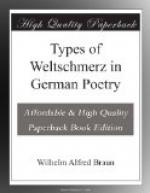If we should seek for the Leit-motif of Lenau’s Weltschmerz, we should unquestionably have to designate it as the transientness of life. Thus in the poem “Die Zweifler,” he exclaims:
Vergaenglichkeit! wie rauschen
deine Wellen
Durch’s weite Labyrinth des Lebens fort![154]
Ten per cent, of all Lenau’s lyrics bear titles which directly express or suggest this thought, as for example, “Vergangenheit,” “Vergaenglichkeit,” “Das tote Glueck,” “Einst und Jetzt,” “Aus!,” “Eitel Nichts,” “Verlorenes Glueck,” “Welke Rose,” “Vanitas,” “Scheiden,” “Scheideblick,” and the like; while in not less than seventy-one per cent of his lyrics there are allusions, more or less direct, to this same idea, which shows beyond a doubt how large a component it must have been of the poet’s characteristic mood.
If Hoelderlin, the idealist, judges the things which are, according to his standard of things as they ought to be, Lenau, on the other hand, measures them by the things which have been.
Friedhof der entschlafnen
Tage,
Schweigende Vergangenheit!
Du begraebst des Herzens Klage,
Ach, und seine Seligkeit![155]
Nowhere is this mental attitude of the poet toward life in all its forms more clearly defined than in his views of nature. That this is an entirely different one from Hoelderlin’s goes without saying. Lenau has nothing of that naive and unsophisticated childlike nature-sense which Hoelderlin possessed, and which enabled him to find comfort and consolation in nature as in a mother’s embrace. So that while for Hoelderlin intercourse with nature afforded the greatest relief from his sorrows, Lenau’s Weltschmerz was on the contrary intensified thereby. For him the rose has no fragrance, the sunlight no warmth, springtime no charms, in a word, nature has neither tone nor temper, until such has been assigned to it by the poet himself. And as he is fully aware of the artistic possibilities of the mantle of melancholy “um die wunde Brust geschlungen,"[156] it follows consistently that he should select for poetic treatment only those aspects of nature which might serve to intensify the expression of his grief.
Among the titles of Lenau’s lyrics descriptive of nature are “Herbst,” “Herbstgefuehl” (twice), “Herbstlied,” “Ein Herbstabend,” “Herbstentschluss,” “Herbstklage,” and many others of a similar kind, such as “Das duerre Blatt,” “In der Wueste,” “Fruehlings Tod,” etc. If we disregard a few quite exceptional verses on spring, the statement will hold that Lenau sees in nature only the seasons and phenomena of dissolution and decay. So in “Herbstlied”:
Ja, ja, ihr lauten Raben, Hoch in der kuehlen Luft, ’s geht wieder ans Begraben, Ihr flattert um die Gruft![157]
“Je mehr man sich an die Natur anschliesst,” the poet writes to Sophie Schwab, “je mehr man sich in Betrachtungen ihrer Zuege vertieft, desto mehr wird man ergriffen von dem Geiste der Sehnsucht, des schwermuetigen Hinsterbens, der durch die Natur auf Erden weht."[158] Characteristic is the setting which the poet gives to the “Waldkapelle”:




